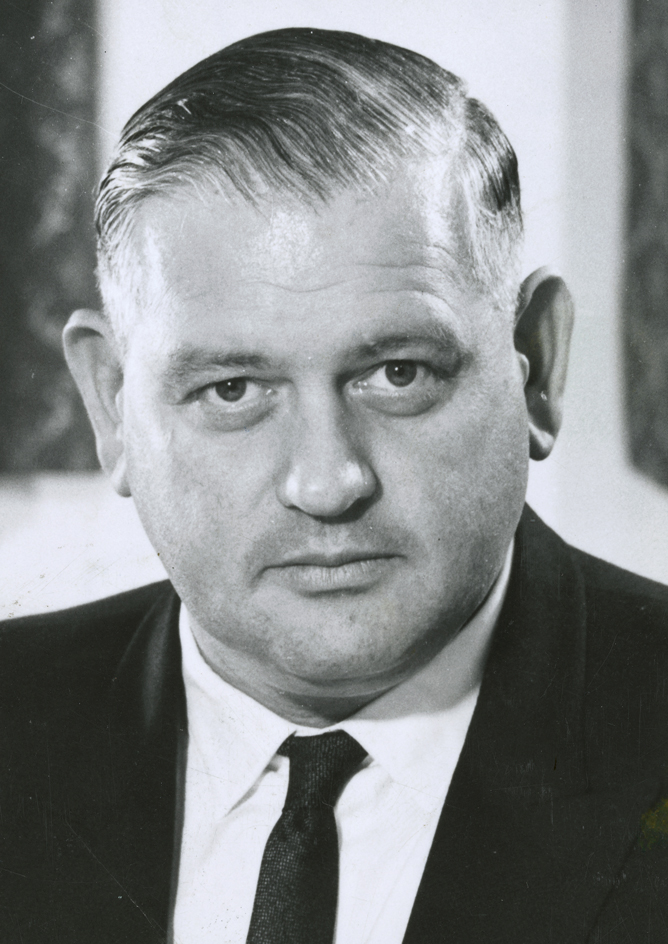Kirk, Norman Eric (1923-1974), was prime minister of New Zealand from 1972 until his death in 1974. He was elected to Parliament in 1957 and became leader of the Labour Party in 1965. The Labour Party is a center-left political party that favors socially liberal policies. Under Kirk’s leadership, the party won a landslide victory in 1972.
Throughout his political career, Kirk promoted government spending for housing, health, employment, and education. As prime minister, he expanded New Zealand’s ties with Africa, Asia, and the Pacific.
Early life and family
Norman Eric Kirk was born on Jan. 6, 1923, in Waimate, in New Zealand’s South Island. He was the oldest of three children born to Norman Kirk, a cabinetmaker, and his wife, Vera Janet Jury Kirk. The family moved to Christchurch just before the Great Depression of the 1930’s. As the global economic slump took hold, Norman’s father had trouble finding work. Young Norman left school at the age of 12 to help support the family. His first job involved cleaning out gutters for a roof-painting business. Norman loved to read, especially about geography and history. 
In October 1940, Kirk started working for New Zealand Railways. However, a problem with his thyroid gland—an organ in the front of the neck—forced him to leave the job. In 1941, Kirk was drafted for military service in World War II, but medical problems kept him from serving. He then held a variety of jobs in the Bay of Plenty area and studied engineering. Kirk worked for a time as a ferryboat engineer.
On July 17, 1943, in Auckland, Kirk married Lucy Ruth Miller (1922-2000), known as Ruth. She was the daughter of George Miller, the postmaster of Taumarunui in the North Island, and his wife, Margaret Miller, a teacher. Norman and Ruth had met in Paeroa. In 1948, the Kirks moved to Kaiapoi, a river town on the South Island’s east coast. There, Kirk built his family house with bricks he made himself. The couple had three sons—Robert, called Bob; Norman John, called John; and Philip. They also had two daughters—Margaret and Robyn. John succeeded his father in Parliament and served from 1974 to 1984.
Political career
Norman Kirk joined the Labour Party in 1943. In 1951, he became chairman of the party’s committee for the electorate (voting district) of Hurunui, which included Kaiapoi. In 1953, he led Labour to victory in the Kaiapoi local council election and became mayor. At age 30, he was New Zealand’s youngest mayor. Kirk improved the town’s roads, sidewalks, and sewerage system.
Parliament.
In 1954, Kirk was unsuccessful in a bid to win the Hurunui seat in New Zealand’s Parliament. In 1957, he ran again for Parliament and won the seat representing the port town of Lyttleton near suburban Christchurch. In Parliament, Kirk quickly gained a reputation as an excellent debater. He rose through the ranks until, at the end of 1965, he became leader of the Labour Party. In 1969, Kirk switched to the Sydenham seat (now Wigram). Labour lost general elections in 1966 and, narrowly, in 1969.
Prime minister.
During the 1972 election campaign, Kirk called for changing the government’s controls on wages and prices. He argued that such controls were unfair to workers in the middle- and low-income groups. Kirk also wanted to change the New Zealand tax system to assist those groups. Labour easily defeated the National Party in the 1972 election. Kirk became prime minister on Dec. 8, 1972.
Kirk also served as minister of foreign affairs, and his government was active in international relations. It opposed South Africa’s policy of racial segregation, known as apartheid. In April 1973, Kirk canceled the South African national rugby team’s planned tour of New Zealand. The cancellation was an act of protest against South Africa’s racial policies. Under Kirk, New Zealand supported the United Nations Trust Fund for South Africa, which provided assistance to victims of racial discrimination.
Kirk’s government established diplomatic ties with China in December 1972. Kirk strongly protested French nuclear testing in the South Pacific Ocean. In June 1973, he sent a warship to the test area to back up his words.
In 1973, the Kirk government passed legislation to make New Zealand Day, later called Waitangi Day, an official national holiday. The holiday celebrates the Treaty of Waitangi, the 1840 agreement between New Zealand’s native Māori (MOW ree or MAH ree) people and representatives of the British government. New Zealanders view the treaty as the nation’s founding agreement.
Kirk’s Labor government later passed the Māori Affairs Amendment Act 1974. The act reintroduced safeguards intended to preserve traditional Māori lands and redefined a Māori as anyone with Māori blood, a change that enabled many more people to claim they were Māori.
In December 1973, Kirk developed dysentery, a disease of the large intestine, while on a tour of Southeast Asia. A heart attack further weakened him. However, Kirk maintained his intense work schedule. He sought to help New Zealand through its struggles with inflation (price increases throughout the economy). He also strongly opposed moves to liberalize laws covering abortion and homosexuality.
Death.
In 1974, Kirk continued to have heart problems and lost a great deal of weight. He missed several parliamentary debates. He became ill on August 19 and was hospitalized the following week. Kirk died of heart failure on August 31. He was buried in Waimate Lawn Cemetery near the graves of his parents.
Kirk’s deputy, Hugh Watt, served as acting prime minister until the Labour Party confirmed Bill Rowling as the new party leader and prime minister on September 6.
In 1975, Queen Elizabeth II of the United Kingdom made Ruth Kirk a dame, a rank of honor corresponding to knighthood.
